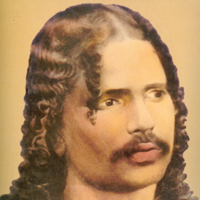Profile of Bhartendu Harishchandra
Pen Name : 'Rasaa'
Real Name : Bhartendu Harishchandra
Born : 09 Sep 1850 | Banaras, Uttar pradesh
Died : 06 Jan 1885 | Banaras, Uttar pradesh
chhānī kahāñ na ḳhaak na paayā kahīñ tumheñ
miTTī mirī ḳharāb abas dar-ba-dar huī
chhani kahan na KHak na paya kahin tumhein
miTTi meri KHarab abas dar-ba-dar hui
Bhartendu Harishchandra was born on September 09, 1850 at Benares. His father, Gopal Chandra, wrote poetry under the pen name of Guru Hardas. He lost both his parents at an early age but he had the opportunity of visiting the Jagannath temple of Puri with them at the age of fifteen.
This founder of modern Hindi literature was a poet of Urdu who wrote under the pen name of “Rasa”. He is the one who brought a new style to Hindi prose. His importance is clearly borne by the fact that a period of Hindi literature is named after him. It is said that he was influenced by the prose style of Sir Syed Ahmad Khan which helped him evolve his own prose style in Hindi. He was one of the important contributors to Institute Gazette Aligarh where he published an article of considerable interest on the law of Hindu inheritance called “Hinduon ka Qanoon-e-Virasat”. Later, this poet of Urdu emerged as a staunch advocate of Hindi in the Urdu-Hindi controversy which raged then.
Bhartendu Harishchandra was deeply influenced by the Bengal Renaissance which helped him write his fiction and plays according to its worldview. He also practiced other prose forms. His stature as a journalist is also noteworthy which is borne out by the fact he ably edited journals like Kavi, Vachan Sudha, Harishchandra Patrika, and Bal Bodhini.
With great imaginative power at his command, he composed poems of lasting value like the ones that belong to the series of his love poems in Hindi. As a playwright also, his sound reputation has stayed on ever since his death. His well-known plays include Bharat Durdasha, Satya Harish, Neel Devi, and Andher Nagri.
Bhartendu was also associated with social reform activities. This led him to publish a journal called Bal Bodhini and write other works to sensitize the need for the education of women. His play Neel Devi is a direct response to this cause. He was a supporter of modern education and technology which is shown in the respect he showed towards Queen Victoria and Prince of Wales. He was also a member of the Scientific Society, Aligarh, and maintained very warm relationship with Sir Syed Ahmad Khan. Sir Syed wanted him to teach Hindi and Sanskrit at Aligarh but he could not somehow accept this offer even though he remained an admirer of Institute Gazette which is well acknowledged in a letter he wrote to Sir Syed in Urdu. This letter is preserved in Sir Syed Academy at Aligarh.
When Sir Syed served as a judge in Benares, a tourist had filed a writ petition against Bhartendu. The case was presented for hearing in the court of Sir Syed who ordered him to pay a small fine and exonerated him from the charge. In spite of the fine relationship that Sir Syed and Bhartendu maintained with each other, they differed on ideological ground which related with Urdu-Hindi controversy and cow slaughter.
Bhartendu Harishchandra passed away on January 06, 1885 in Benares at the early age of thirty four.

